5/21/12 – Setting Off
On the plane set to leave Chicago. It’s actually happening, or at least it would seem so! Great time connecting with the team, especially old teachers and friends. Mark assures us that God will speak to each of us at least once, probably 3-4 times. Mentioned me in connection with Philippi ironically enough. Looking most forward to Ephesus, Philippi, and Rome, I think. Rome for obvious reasons. Ephesus because it’s my favorite letter, and Philippi because it may be the one I need most right now: contentment in knowing Christ, joy and trust without anxiety or the competitive spirit. […] But more than anything I rest content in Philippians. Hard to know what emotions to expect, let alone thoughts. Feel somewhat unprepared content-wise, but I’m sure that’s normal. Learning on the back end will probably progress faster than now. At any rate, I’ll record my thoughts when I can and simply pray them when I cannot. Here’s to pilgrimaging.
5/22 – Mid-flight
Ambien works. Unfortunately though, in my drug-initiated naptime I knocked my glasses out of the pouch in front of me. No worries. Except then apparently I stepped on them and snapped them clean in half. I do have another pair, but I’ve grown fond of these – especially given the sun we’re going to be in. Maybe someone will have superglue. Glad I’m not really a Roman, or this omen would not speak well of what’s to come!
5/23 – Hotel in Cappadocia
I already want to give up trying to find adequate adjectives to describe this experience, and we’re only two days in. We spent our first night in Antioch, which is, you know, only the birthplace of Christian missions and the place we were first called “Christians.” On the former, what do I say except for the fact that historically speaking, what happened here is the reason we can follow Jesus without also taking upon ourselves the burden of Torah. Interestingly enough in that vein, it is also the place where Paul confronted Peter for backsliding on this very issue. Peter was the one who originally took the gospel to Gentiles, but when Paul arrived in Antioch Peter had withdrawn from table fellowship with the Gentile believers because of pressure from some fundamentalist Jewish Christians from Jerusalem. Paul rebuked him to his face, as he is happy to point out in Galatians 2.
We walked along the Orontes the first night, and then woke up and traveled to the church of St Peter, which is basically in a cave. Both Chris (Dewelt) and Mark (Moore), our guides, shared some thoughts. I learned something new about the whole first being called “Christians” – two somethings, actually. First, the word for “called” is apparently in a form that makes it self-referential. In other words, we called ourselves Christians. I also learned that the form of “Christians” has a Latin ending, which is significant for two reasons. With the Latin ending, the word effectively spans three cultures. It is a Hebrew idea – the mashiach or “anointed one,” which in our case essentially means King – put into Greek form (“Christ”) with a Latin ending. The second point answers the question of why, practically speaking, they used that ending. They used it because they were officially identifying themselves as a recognizable “club” or social/religious/political group; without official enlistment they could not legally gather for worship. The irony is that the way they enlisted themselves basically thumbs their noses as the empire: “Alright Caesar, we’ll tell you who we are. We’re the ones who worship the world’s real Savior, Lord, and King.” Very cool.
We then took a bus ride to Tarsus, which is the birthplace of the Apostle Paul, or “Saul” as it was at the time. (Again, no big deal right?!) We gathered around a well from which Saul (or at least someone in his family) would have drawn water. Tarsus boasted the third most prominent university at the time, and here two things happened that uniquely prepared Paul for his mission to reach Gentiles with the good news of Jesus: (1) He was born into Roman citizenship, which he used among other things to gain a hearing before the emperor so he could preach the true Lord at the heart of an empire run by a much lesser power that be’s. (2) He studied Greco-Roman thought, maybe most notably the philosophy of Stoicism. His time spent with these poets and thinkers positioned him perfectly to address especially the higher realms of Greco-Roman society, whereas they would have likely laughed out of the room many others preaching the same truths about Jesus. We filmed a bit here, talking about how Tarsus may have represented some difficult seasons or realities in Paul’s life, and yet played such a crucial role in his preparation. Romans 8.28 was not theory for Paul; it actually told his own story.
We then re-loaded the bus and traveled along the Taurus/Tores Mountain range on our way into the region of Cappadocia. I have much to say about Cappadocia, but I may need to wait until tomorrow.
Super glue worked btw. 🙂 But I was handed binoculars and proceeded to try to look through them . . . in the wrong direction! We all had a good laugh about that!
5/24 – “Same God”
Today was heavy for me. I’m sure in large part it’s because today is Claire’s 2nd birthday and I can’t hold and hug and kiss and squeeze her. There is nothing in the world like being a dad. Probably also my body is pretty spent trying to overcome a lack of sleep and establish a new rhythm. But some of it went beyond these things I think. I doubted Mark when he said God would speak to each of us, but I probably shouldn’t have.
We spent the day in Cappadocia, which is a region of Turkey mentioned twice in Scripture – in Acts 2 some Cappadocians were present for Peter’s Pentecost sermon and miraculously heard his words in their own language/dialect; and in 1 Peter 1 they are named as recipients of that letter. 1 Peter emphasizes endurance and love in the face of suffering, which seemed to portend the future to some degree. The main feature of Cappadocia is homes cut into the side of rocks. (Ancient volcanic eruptions have resulted in a rock material that is easy to dig through.) Any eye can see this – actually you can’t miss it – but in the last century archaeologists found something more. They discovered that Christian communities also dug into the surface from the top down and created literal underground cities. They’ve discovered 40 hidden cities so far, with some having as many as eight layers or stories. Thousands of people lived below the earth. Why? It wasn’t just for cheap heating and cooling. They were avoiding persecution. They would release huge stones into the openings in order to prevent attackers from getting in, or at least to give themselves time to sneak out secret passageways. Pretty incredible. The practicality and artistry of the underground (and into the sidewall) homes and churches was at times breathtaking.
Another important fact about this region is that it gave us three of the chuch’s best early theologians: Basil, Gregory of Nyssa, and Gregory Nazianzus. Known as the “Cappadocian Fathers” and sainted in both the Eastern and Western church traditions, these three teachers provided the final articulation and defense of the doctrine of the Trinity. We would not have Christianity in its present form(s) were it not for the courage and clarity of these men.
For whatever reason, all these things together overwhelmed me. The suffering, the passion for truth, the history, the willingness to live in caves to avoid the consequences of confessing Jesus as Lord. As I walked along the path at one point almost in tears, two words made their way into my mind: Same God. We worship the same God they did – the God revealed most clearly in Jesus Christ and “explained” to the clearest possible extent as Father, Son, and Holy Spirit. They believed this God was worth living risky lives of faithful endurance in spite of the constant threat of suffering and even death. I suppose there’s no good reason for us not to believe the exact same thing.
5/25 – Paul’s First Sermon
Today was mostly a driving day (as in, 12 hours), but we stopped off at Pisidian Antioch for a bit about halfway through. This site was full of unexpected fantasticness. It’s the place where Paul preached his first recorded sermon (now in Acts 13), which essentially retells the local synagogue their own history with God. Paul presents all of history as (a) directed by God and (b) directed toward Christ. The site itself has been half-excavated and then abandoned because itw asn’t profitable enough. This was great for us, because we were free to explore some of the nine actual sites with no traffic or interruptions. We stood among the remains of a church what was not unlikely built directly over the synagogue where Paul would have preached this message. For me the other highlight was an actual temple built to Caesar Augustus, which by definition dates back to the first century. I’ll probably have more to say about Augustus when we get to Rome (if not before), so for now I’ll just say that I don’t think anyone outside the NT is as important for understanding the NT as Augustus (perhaps especially when it comes to the “gospel”).
We ended the day in Hierapolis, which sits across a valley from Colossae with Laodicea in between .We’re exploring this region tomorrow, but tonight we spent a few hours in teh famous Hierapolis hot springs pools. It was incredible!
. . .
More to come!!


